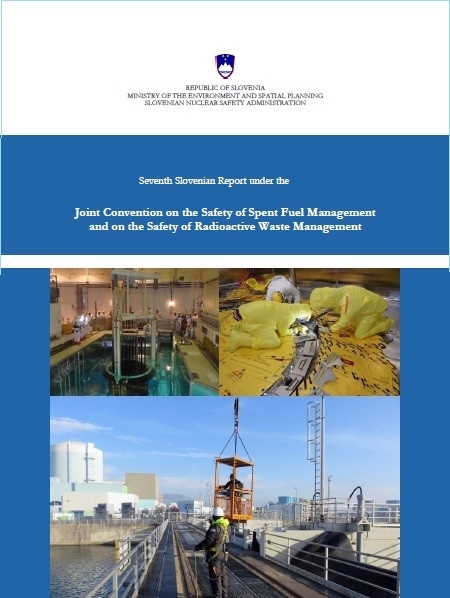On 22 October 2020, the Government of Slovenia endorsed the 7th National Report under the Joint Convention on the Safety of Spent Fuel Management and on the Safety of Radioactive Waste Management and sent it to the International Atomic Energy Agency. With this Slovenia fulfilled one of the obligations under the Joint Convention on time.
The report provides information on radioactive waste management and spent fuel management in the period 2017 – 2019, i.e. the inventories of spent fuel and radioactive waste as of the end of 2019, description on legislative and regulatory system and the evaluation of the fulfilment of the obligations under the Joint Convention. The report will be presented in the seventh review meeting of the contracting parties to the Joint Convention, to be held in Vienna from 24 May to 4 June 2021. The report concludes that the Slovenian regulation and practices are in compliance with the obligations of the Joint Convention.
During 2017 and 2019 major progress was made in connection with spent nuclear fuel dry storage of the Krško Nuclear Power Plant. The dry storage building is scheduled to be operational at the end of 2022. The new Waste Manipulation Building for handling waste located near the Auxiliary Building and the Solid Radwaste Storage Building were constructed and put into operation in 2018.
A project for obtaining the construction permit for the low and intermediate level radioactive waste repository has been prepared. The on-going processes of cross-border environmental impact assessment and of environmental approval in Slovenia should be completed to fulfil one of the prerequisites in the process of obtaining the construction permit of the low and intermediate level radioactive waste repository.
In 2019, the third revisions of the Krško Nuclear Power Plant Decommissioning Programme and of the Programme for the Disposal of the radioactive waste and spent fuel from the Krško Nuclear Power Plant were completed. After administrative procedures in both countries, they were approved by the Intergovernmental Commission in July 2020. Based on the approved programmes, the contribution into the Slovenian Fund for Financing the Decommissioning of the Krško Nuclear Power Plant and the Disposal of Radioactive Waste from the Krško Nuclear Power Plant paid by the Slovenian electrical power company GEN energija, d.o.o., increased from the previous value of 0.30 euro cents per kWhe to 0.48 euro cents per kWhe.
After examining all possibilities for a joint disposal of low and intermediate level radioactive waste from the Krško NPP, in September 2019 the Intergovernmental Commission determined that a common solution was not possible to be achieved. Consequently, such waste will be divided in half and each country will proceed developing its own disposal capabilities. Regarding the storage of high level waste and spent fuel after the cessation of the Krško Nuclear Power Plant operation in 2043, Slovenia and Croatia will negotiate on a joint solution for only one repository in either country or for a regional or multinational solution.
Based on the report of the first periodic safety review of the Central Storage Facility, which was completed in 2018, the licence renewal for the operation of the Central Storage Facility for the next 10 years was approved.
On the basis of the first periodic safety review, the TRIGA Mark II Research Reactor performed all the actions from the findings of the 2014 periodic safety review by the end of 2019.
The environmental remediation of the Boršt hydro-metallurgical tailings disposal site has not been finished yet. In 2019, additional remediation works for ensuring the long-term stability of the disposal site were carried out.
The report is prepared in English and can be found on Slovenian Open Data Portal. It was prepared by the Slovenian Nuclear Safety Administration. Other report contributions were the Krško Nuclear Power Plant, Jožef Stefan Institute, Agency for Radwaste Management, Žirovski Vrh Mine public company, Ministry of Infrastructure, Institute of Oncology Ljubljana, Ljubljana University Medical Centre – Department of Nuclear Medicine and Slovenian Radiation Protection Administration.
